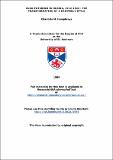Cubo-Futurism in Russia, 1912-1922 : the transformation of a painterly style
Abstract
Cubo-Futurlsm is defined both in terms of the development of
Cubist and Futurist styles of painting by the Russian avant-garde
artists Liubov Popova, Nadezhda Udaltsova, Olga Rozanova and Ivan
Puni between 1912 and 1915, and in terms of the reworking and
transformation of' these two movements against the unique Russian
cultural background into a new non-objective art after 1915.
The Russian artistic and cultural context, including Ouspensky
and the fourth dimension and the linguistic theories of the
Futurist poets Alexei Kruchenykh and Vellmlr Khlebnikov concerning
a transratlona]. language (zaum), played a vital role for a number
of artists in their move into non-objective painting and
construction. Zaum influenced the reworking of Cubist collage by
Malevich, Puni and Rozanova, and the abstract collages and reliefs
of Rozanova and Puni are defined as visual equivalents to the new
logic "broader than sense" envisaged by zaum. As part of the
Russian cultural context, indigenous art forms also acted as
possible stimuli for the development of a non-objective painterly
style. The abstract potential which artists saw in the icon was
exploited by Puni in his non-objective reliefs of 1915-c1919, and
the principles of decoration in Islamic Architecture may be seen as
an important source for Popova's painterly architectonics of
19 16-18.
After 1916, the principles of non-objective painting,
established fran an examination of Cubism and Futurism, were
applied to tasks of design and the theatre. Puni, Rozanova and
Udaitsova designed household and fashion items, and Alexandra Exter
and Alexandr Vesnin completed set and costume designs for several
productions in the Moscow Kamerny Theatre between 1916 and 1922.
In their attempt to articulate a dynamic spatial environment, the
principles for these designs derived from earlier Cubo-Futurist
experiments in painting.
Type
Thesis, PhD Doctor of Philosophy
Collections
Items in the St Andrews Research Repository are protected by copyright, with all rights reserved, unless otherwise indicated.

